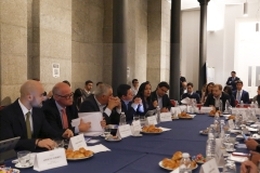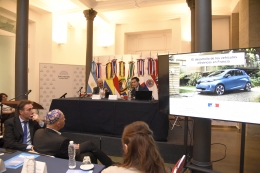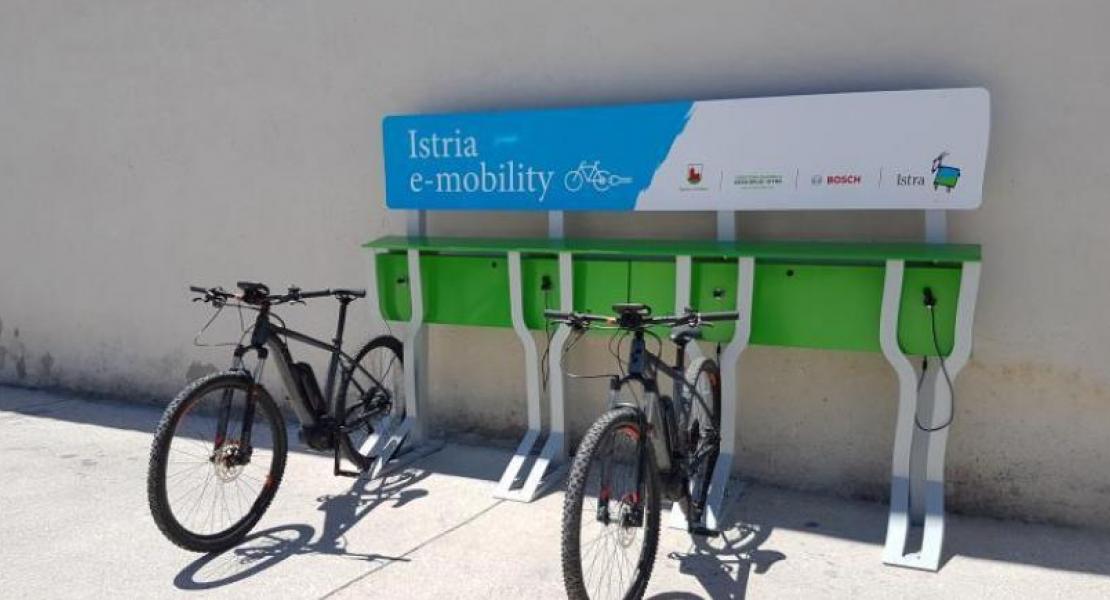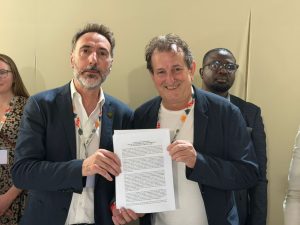GLOBE Argentina hosted the ‘1st Latin American Parliamentary Workshop on Legislation for Sustainable Electric Mobility’ the Argentine Chamber of Deputies in collaboration with UNEP to prepare a regional public policy guide for sustainable electric mobility to provide long-term legal certainty and attract investment.
The Chamber of Deputies of the Argentine Congress hosted the first ‘Latin American parliamentary Workshop on Legislation for Electric and Sustainable Mobility’, with the aim of accelerating the transition to electric mobility in the region to reducing emissions that cause climate change and air pollution, by involving legislators and regulators from Latin American countries in the preparation of a regional guide for developing a public policy for sustainable electric mobility that provides long-term legal security and attracts investment.
The meeting was organized by the Chamber of Deputies of the Nation under the leadership of GLOBE Argentina, GLOBE International and UN Environment, in the context of GLOBE’s Electric Mobility Initiative (EMI). The national deputy Juan Carlos Villalonga, President of GLOBE Argentina, was in charge of opening the day. ‘The political challenge is to promote and accelerate the energy transition’, he said. Juan Carlos Villalonga, who has authored one of the bills currently tabled in the National Congress on this subject, stressed that ‘electric mobility represents a new political, not just technological agenda’.
The Argentine Secretary of Environment and Sustainable Development, Rabbi Sergio Bergman, said that ‘Argentina is working across the board on clean and sustainable mobility, taking advantage of experiences in other countries where this initiative has progress and development’. The Secretary stressed that ‘our country is oriented towards the development of a national plan for mitigation and adaptation to climate change as a primary objective’, and noted that ‘to achieve electric mobility’ it is also necessary to ‘have an air quality law’ and to ‘link it not only to the area of transportation but also to public health’.
Gustavo Máñez, UN Climate Change Coordinator for Latin America and the Caribbean, expressed his support for governments to ‘generate regulations and public policies to develop strategies for electric mobility, that is, sustainable vehicles’. He remarked that ‘there is an exponential increase in vehicles and means of transport that generate many carbon emissions’, on the basis of which he stressed: ‘We need public policies that promote zero emissions electric mobility’.
Regional Presence
The regional legislative experiences panel was made up of Latin American parliamentarians including Senators Alejandro Guillier and David Sandoval from Chile; Representative Fabián Díaz from Colombia; Representatives Franklin Corella and Silvia Rojas from Costa Rica; Assemblymen Esteban Albornoz and César Litardo from Ecuador; Representatives Adolfo Torres and Karen Michel González from Mexico; Representative Edison Broce from Panama; Congressman Miguel Román from Peru; Representatives Juan José Olaizola and Nelson Tierno from Uruguay, and Lourdes López, advisor to the Paraguayan Senate.
The representative of the European Union, Victoria Giussani, stressed the importance of the ‘joint work’ between the ‘private sector, the public, legislators, academics and civil associations’. In this sense, she valued ‘the integral commitment towards an energy transition and the reduction of carbon’.
Gianni López, Director of the Mario Molina Center for Research and Development in Chile, stressed: ‘There are serious problems of CO2 emissions in our region and regulations in our countries are lagging behind’. In addition, he referred to statistics that show the ‘impact of air pollution on the health of Argentines’.
The President of the International Automobile Federation (FIA) Region IV, Jorge Tomasi, made a brief summary of its functions and explained that his organization is a leader in relation to electric mobility in Latin America. ‘The objective of FIA’s Sustainable Mobility Program is to guarantee efficient actions and policies that promote a clean, safe and accessible mode of transportation’, he said.
The meeting was also attended by representatives of major automakers who agreed ‘on the great challenge they face’ and committed themselves to work together with the countries of the region for the development of sustainable mobility in Latin America, aimed at reducing pollution and increasing the welfare of the population. ‘The only way to solve this problem is in a comprehensive manner, incorporating good practices and a regulatory framework’, said Hernán Bardi, Director of Public Affairs, Communication and Sustainability at Groupe Renault.
The State Secretariat for Environment and Sustainable Development of Argentina will host on April 24 a follow-up meeting of the parliamentary workshop.
Related content
Electro-Mobility
The shift from internal combustion engine vehicles (ICEs) to electric vehicles (EVs) is happening. Coalitions of leading national Governments from countries across the income range and the automotive sector have committed to ambitious mid-term targets for EVs production and use, infrastructure roll-out and gradual banning of diesel and ICE vehicles.







